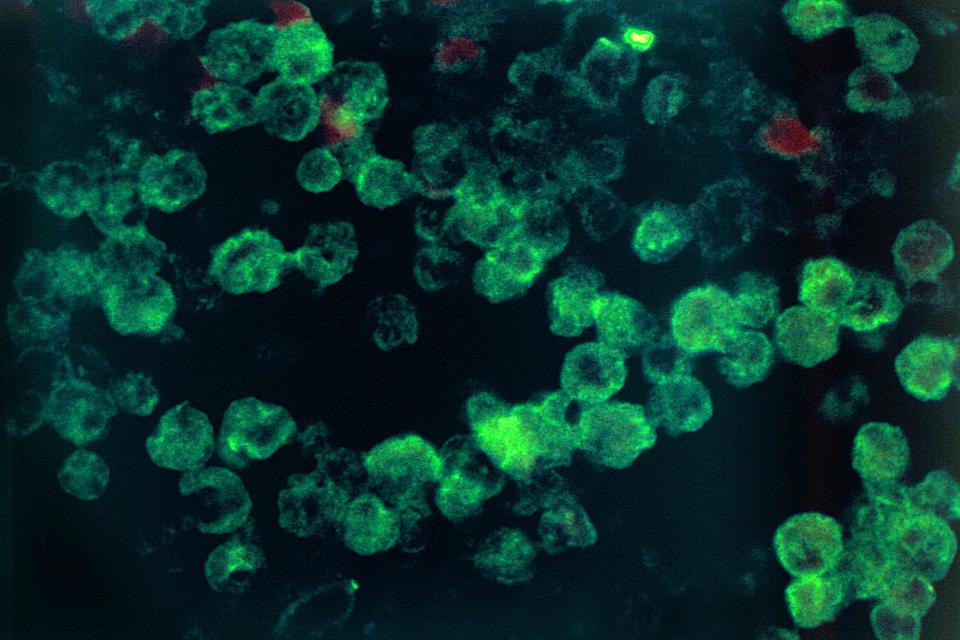Georgia Resident Dies from Rare Brain-Eating Amoeba
Prior to the incident, there have been five other cases reported in Georgia since 1962, according to the health department

Smith Collection/Gado/Getty
Naegleria fowleri.A Georgia resident died from a rare brain-eating amoeba after they likely swam in a freshwater lake or pond, officials said.
The individual was infected by Naegleria fowleri, an amoeba that resides in soil and warm, freshwater lakes, rivers, ponds and hot springs, the George Department of Public Health announced Friday in a news statement.
No further information was offered about the person’s identity or specifically when and where they were infected, NBC News reported. Prior to the incident, there have been five other reported cases in Georgia since 1962.
The infection, usually primary amebic meningoencephalitis (PAM), causes damage to brain tissue, resulting in brain swelling and often death, said the health department.
Related: 2-Year-Old Nevada Boy Dies from Brain-Eating Amoeba: 'He Fought 7 Days'
The infection occurs when water containing Naegleria fowleri travels up the person’s nose, said the department. It cannot spread if swallowed or transmitted from person to person.
The health department added that this type of amoeba is not found in saltwater, such as the ocean, or properly treated pools and drinking water.
Symptoms begin to appear about five days following infection but can also show in one to 12 days, said the department. They “typically start with severe headache, fever, nausea and vomiting and progress to stiff neck, seizures, and coma that can lead to death.”
Related: 15-Year-Old Missing After Disappearing in Water While Playing with Brother at Coney Island Beach
Naegleria fowleri was cited in the recent death of Woodrow Turner Bundy, a 2-year-old boy who may have become exposed after a swim in Ash Springs, Nevada.
“He fought 7 days,” Woodrow’s mother, Briana Bundy, wrote in a Facebook post shared on July 18. “The longest any person has survived on record is 3. I knew I had the strongest son in the world. He is my hero and I will forever be grateful to God for giving me the goodest baby boy on earth, and I am grateful to know I will have that boy in heaven someday.”

Smith Collection/Gado/Getty
Naegleria fowleri.The child began experiencing “flu-like symptoms” when his parents decided to take him to the hospital, per friends of the family. At first, doctors assumed it was meningitis and began treatments. But it was later discovered that Woodrow’s symptoms were linked to brain-eating amoeba.
In 2021, David Pruitt, a 7-year-old boy from California, died from primary amoebic meningoencephalitis after he swam in a Northern California lake, according to a GoFundMe created in his honor.
Meanwhile, Florida teen Caleb Ziegelbauer, who was 13 at the time, contracted the typically-fatal infection while swimming at Port Charlotte Beach, Florida. A week later, he experienced a fever, headaches and hallucinations. His family rushed him to the emergency room where doctors confirmed the infection.
During his hospitalization, Caleb had a seizure and required intubation in the ICU, according to his loved ones. He was transferred to a rehabilitation facility in Chicago to further his recovery.
Never miss a story — sign up for to stay up-to-date on the best of what PEOPLE has to offer, from celebrity news to compelling human interest stories.PEOPLE's free daily newsletter
The Centers for Disease Control and Prevention recommend several precautions against being infected by this type of amoeba, including not jumping into bodies of warm freshwater, particularly in the summertime; holding your nose shut or keeping one’s head above water while in warm freshwater; not sticking one’s head underwater in hot springs; and avoid stirring up sediment in shallow warm freshwater since amoebae are likely to reside in sediment.
The government health agency also reported that only four out of 157 people in the U.S. survived primary amebic meningoencephalitis between 1962 and 2022.
For more People news, make sure to sign up for our newsletter!
Read the original article on People.

